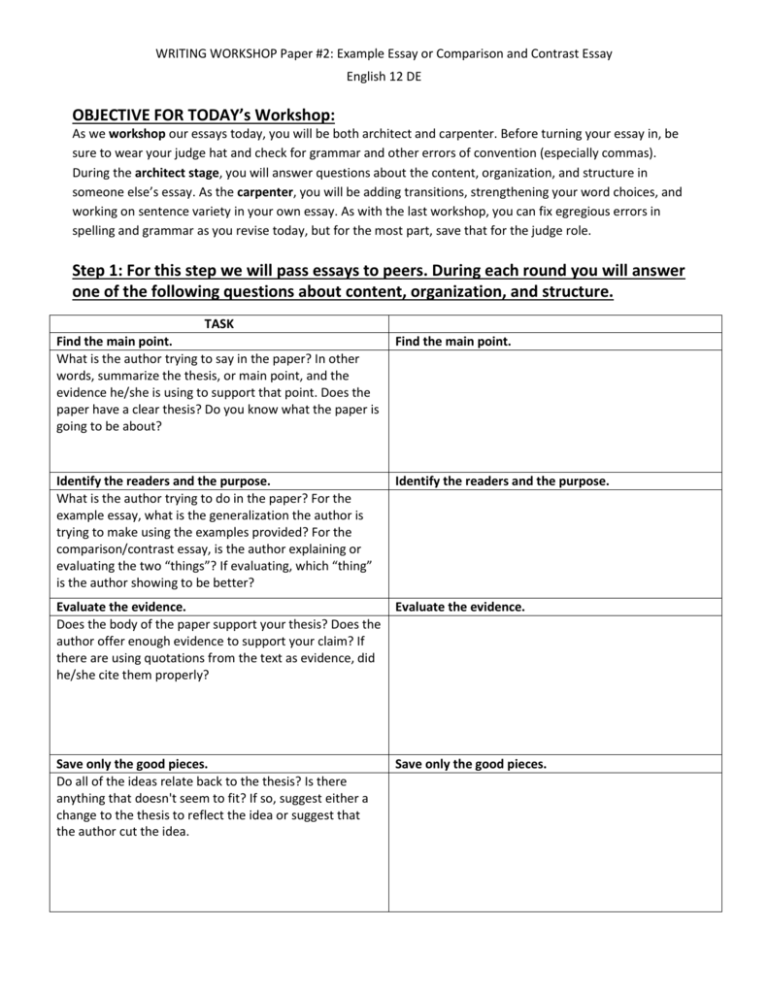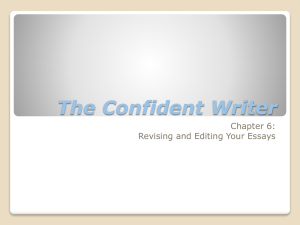WRITING WORKSHOP Paper #2: Example Essay or Comparison
advertisement

WRITING WORKSHOP Paper #2: Example Essay or Comparison and Contrast Essay English 12 DE OBJECTIVE FOR TODAY’s Workshop: As we workshop our essays today, you will be both architect and carpenter. Before turning your essay in, be sure to wear your judge hat and check for grammar and other errors of convention (especially commas). During the architect stage, you will answer questions about the content, organization, and structure in someone else’s essay. As the carpenter, you will be adding transitions, strengthening your word choices, and working on sentence variety in your own essay. As with the last workshop, you can fix egregious errors in spelling and grammar as you revise today, but for the most part, save that for the judge role. Step 1: For this step we will pass essays to peers. During each round you will answer one of the following questions about content, organization, and structure. TASK Find the main point. What is the author trying to say in the paper? In other words, summarize the thesis, or main point, and the evidence he/she is using to support that point. Does the paper have a clear thesis? Do you know what the paper is going to be about? Find the main point. Identify the readers and the purpose. What is the author trying to do in the paper? For the example essay, what is the generalization the author is trying to make using the examples provided? For the comparison/contrast essay, is the author explaining or evaluating the two “things”? If evaluating, which “thing” is the author showing to be better? Identify the readers and the purpose. Evaluate the evidence. Does the body of the paper support your thesis? Does the author offer enough evidence to support your claim? If there are using quotations from the text as evidence, did he/she cite them properly? Evaluate the evidence. Save only the good pieces. Do all of the ideas relate back to the thesis? Is there anything that doesn't seem to fit? If so, suggest either a change to the thesis to reflect the idea or suggest that the author cut the idea. Save only the good pieces. WRITING WORKSHOP Paper #2: Example Essay or Comparison and Contrast Essay English 12 DE Step 2: On your own essay, revise your word choice and sentence structure. Task 1: Highlight the first word of every sentence. Make sure you have a variety of sentence openers. Task 2: Highlight the verb in each sentence. Make sure you have strong verbs. Avoid relying on verbs such as “is” “are” “were” “was” “got” “get” “go” “make” “do” “does”. If you find it tedious/overkill to highlight every single verb, then just highlight the verbs listed above and any verbs that you repeat. Task 3: Highlight every use of the words “thing” and “it”. When you revise again, do your best to eliminate these words. You can always find a clearer, more accurate way to describe the “thing” or the “it”. Task 5: Sentence variety—make sure you have a variety of sentence lengths. If you have lots of short sentences, work to combine them together. Task 6: Transitions—make sure you are using transitions between and within paragraphs. Transitions connect ideas for the reader. Step 3: The Judge Tighten and clean up the ideas. Do all of the ideas in the paper make sense? Are there unclear or confusing ideas or sentences? Read the paper out loud and listen for awkward pauses and unclear ideas. Cut out extra words, vagueness, and misused words. Tighten and clean up the ideas. Step 4: Reflection Switch from writer-centered to reader-centered. Try to detach yourself from what you've written; pretend that you are reviewing someone else's work. What would you say is the most successful part of your paper? Why? How could this part be made even better? What would you say is the least successful part of your paper? Why? How could this part be improved? Switch from writer-centered to reader-centered. This workshop is worth 20 summative points. In order to earn the full points, you need to: 1) Have a printed, completed draft for the workshop 2) Complete all steps on this handout and turn the handout in with your final essay 3) Highlight your draft and revise weak verbs and pronouns, add/identify your transitional phrases, and ensure variety in your sentences. Show me that you did this step by writing your changes directly on your draft. If I see that you highlighted/identified these on your draft but then you didn’t revise them out for your final, you will not receive full credit.







